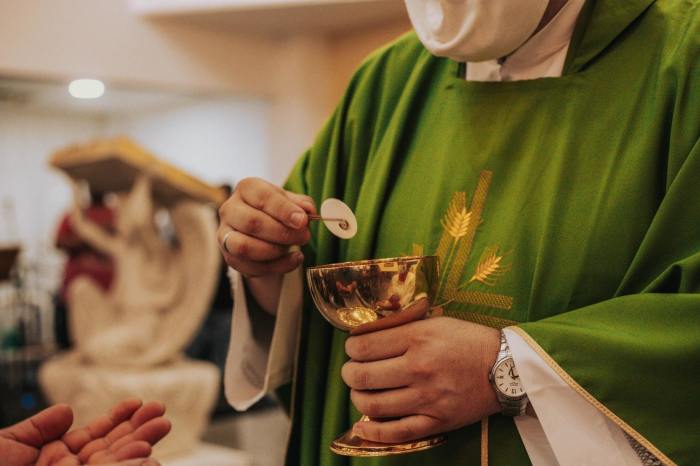The Christian Post's top 10 news stories of 2021 (part 1)

10. US Catholic bishops debate communion for pro-abortion politicians
The debate about whether Catholic politicians who support a legal right to abortion should receive communion reached a new level of prominence as President Joe Biden, a Catholic, took office in January.
As Biden campaigned for the presidency in 2019, one priest made national headlines when he refused to serve communion to the former Delaware senator because of his steadfast support for policies that allow government funding of businesses that provide abortions, nationally and internationally, and remove restrictions on abortion access. The Catholic Church has long stood in opposition to abortion.
With Biden taking office and vowing to support the enshrinement of abortion rights into federal law, the U.S. Conference of Catholic Bishops debated the drafting of “a formal statement on the meaning of the Eucharist in the life of the church” at its general assembly meeting in June.
Some speculated that the USCCB was drafting a national policy advising that communion be withheld from Catholic politicians who support abortion access in their public policy stances.
The bishops voted to move ahead with drafting the document, stressing that “the document being drafted is not meant to be disciplinary in nature, nor is it meant to be targeted at any one class of persons.”
“The question of whether or not to deny any individual or groups Holy Communion was not on the ballot,” the body of bishops stated in a June question-and-answer document. “The bishops made no decision about barring anyone from Holy Communion. Each Catholic — regardless of whether they hold public office or not — is called to continual conversion, and the U.S. bishops have repeatedly emphasized the obligation of all Catholics to support human life and dignity and other fundamental principles of Catholic moral and social teaching.”
Additionally, the document vowed that “there will be no national policy on withholding Communion from politicians.” Instead, it seeks to “present a clear understanding of the Church’s teachings to bring heightened awareness among the faithful of how the Eucharist can transform our lives and bring us closer to our creator and the life he wants for us.”
The final draft of the document, titled “The Mystery of the Eucharist in the Life of the Church,” was published in November. As the bishops indicated, it does not explicitly bar pro-abortion Catholic politicians from receiving communion. The word “abortion” only appears once, listed alongside murder as an example of an act “opposed to life.”
“If a Catholic in his or her personal or professional life were knowingly and obstinately to reject the defined doctrines of the Church, or knowingly and obstinately to repudiate her definitive teaching on moral issues, however, he or she would seriously diminish his or her communion with the Church," the document reads. "Reception of Holy Communion in such a situation would not accord with the nature of the Eucharistic situation, so that he or she should refrain.”
Additionally, the document features a statement from Pope St. John Paul II, who proclaimed that “In cases of outward conduct which is seriously, clearly and steadfastly contrary to the moral norm, the Church, in her pastoral concern for good order of the community and out of respect for the sacrament, cannot fail to feel directly involved.” He cited the Code of Canon Law, which states that those who “obstinately persist in manifest grave sin” shall not be admitted to communion.
The communion-abortion debate divided many in the Catholic Church. Supporters of withholding communion from pro-abortion Catholic politicians pointed to the Code of Canon Law and a 2004 letter from then-Cardinal Joseph Ratzinger, who later became Pope Benedict XVI, as justifications for their position.
“Regarding the grave sin of abortion, when a person’s formal cooperation becomes manifest (understood, in the case of a Catholic politician, as his consistently campaigning and voting for permissive abortion and euthanasia laws), his pastor should meet with him, instructing him about the Church’s teaching, informing him that he is not to present himself to Holy Communion until he brings to an end the objective situation of sin, and warning him that he will otherwise be denied the Eucharist,” Ratzinger told top Church leaders in the U.S. at the time.
According to Ratzinger: “When ‘these precautionary measures have not had their effect or in which they were not possible,’ and the person in question, with obstinate persistence, still presents himself to receive the Holy Eucharist, ‘the minister of Holy Communion must refuse to distribute it.” Ratzinger described the withholding of communion from pro-abortion Catholic politicians as “not a sanction or penalty” but rather a reaction to “the person’s public unworthiness to receive Holy Communion due to an objective situation of sin.”
Opponents of withholding communion from pro-abortion Catholic politicians expressed concern that such a policy would exacerbate existing divisions within the Church. Cardinal Luis Ladaria, the prefect of the Congregation for the Doctrine of the Faith of the Catholic Church, made that argument in a letter to the USCCB.
U.S. House Speaker Nancy Pelosi, D-Calif., another pro-choice Catholic politician, praised the Vatican letter, while 60 Catholic bishops cited Ladaria’s letter when calling for a delay on the debate about communion.
Ryan Foley contributed to this report.



























